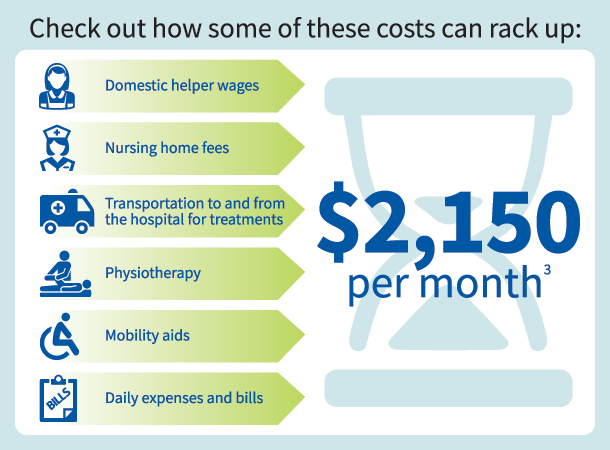You may have heard your financial adviser representative mentioning the term "critical illness" when they talk about medical plans. Or perhaps from your friends and family who have been hospitalised or have been ill.
You could be thinking, "Hey, I already have health and medical plans" or "Isn't it too soon to think about being critically ill? I'm so young and fit!"
The thing to realise is this: there are many costs that your hospitalisation plan will not be able to cover, if ever you become critically ill.
These include providing for current expenses that you might be taking for granted, namely cost of living or associated costs of being ill such as long-term care, rehabilitation, employing a maid, mobility aids and so on.
Critical illness can strike anyone, anytime
Serious illness can be a bummer and can affect the healthiest and fittest of people. It could be due to genetics, environmental exposure or just the worst of luck, but anyone can be struck down by a terminal disease.
Cancer, for example, claimed 14,148 victims in 20151, that’s almost 39 cases every single day. This is up by 20% from 20111. Kidney failure cases are just as scary, with 1,619 people losing the use of their kidneys in 2015 as compared to 1,587 in 20112.
Because such diseases are so debilitating, you may no longer be able to work and as such, lose the income that normally goes towards providing for yourself and your dependants (if any). This means mounting bills (even debts!) and inability to finance your regular expenses such as your children's school or childcare fees, grocery purchases, transport costs and many other day-to-day purchases that are commonly taken for granted.
How CI coverage can really make a difference
Perhaps the most important value of having a CI plan is the lump sum payout it gives. While your health insurance takes care of hospitalisation and perhaps outpatient treatment, your CI plan gives you a sum of money that you can use to take care of all other financial needs and obligations related to your illness.
These include costs not covered by your hospitalisation plans, such as regular bills and daily expenses that still continue despite your loss of income while on no pay leave. Or having to get extra help to take care of your children or elderly parents – such as sending them to a daycare centre or employing a maid - while you're seeking treatment or recovering.

Depending on how much time you need to recover and how long you're unable to earn an income, the above costs would further compound. This is where having a lump sum of money would help – you may then be able to fully finance or at least greatly subsidise these various needs.
At the same time, not having to worry about lack of financing will grant you the emotional mind state that can greatly contribute to your recovery. You just can't put a dollar value on what that's worth!
Do I need a CI plan if I have no dependants?
Single and swinging? It's still smart to have a CI plan in place. You may not have the heavy financial obligations of someone who is married with children or has elderly parents. However, being alone may also mean that you have no one to count on but yourself.
Thus, having a CI plan in place takes care of a loss of income and having a lump sum payout is always useful, especially in the event where you need long-term care or rehabilitation after your treatment or surgery. Furthermore, if you live alone, you may even need to stay at an after-care facility to recuperate because there is no one to take care of you at home.
It's never too early to be prepared
With today's medical advancements, early diagnosis of illness is possible. There's good evidence that treatment of critical illnesses at the early stages can improve your chances of recovery. Singlife's My MultiPay Critical Illness Plan4, for example, provides multiple payouts for different severities of critical illnesses, up to a total of 900% of the Sum Assured. It covers 132 conditions across various stages of critical illnesses and the recurrence of 6 specified critical illnesses including re-diagnosed major cancer, recurrent heart attack of specified severity and recurrent stroke with permanent neurological deficit.
This could make all the difference for you and your loved ones as that cash can help you manage the financial expenses that come with a critical illness – so you can focus on treatment and recovery.
Footnotes:
1 Singapore Cancer Registry Annual Registry Report 2015, National Registry of Diseases Office, 19 Jun 2017
2 Singapore Renal Registry Annual Report 2016, National Registry of Diseases Office, 18 Jan 2018
3 Aviva’s Long Term Care Study 2011
4 Policy Terms and Conditions Apply. Please refer to the Product Brochure for more information.
As of 1 January 2022, Aviva Singapore is now Singlife with Aviva.
Updated on: November 2020







